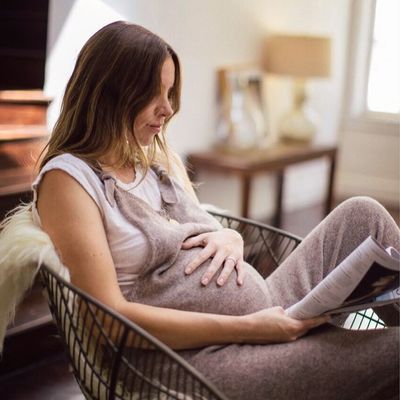
My Journey Into Motherhood: Megan Strachan
I always knew I wanted children. But there was a lot about being a parent I didn’t know if I would like. The first time I fell pregnant, I was working at Anine Bing, but I miscarried at around five or six weeks. Although the pregnancy had been planned, when I initially found out about it, I panicked. I thought, “What if this isn’t what I want?” So, when I lost the baby, I blamed myself. I was devastated and didn’t handle it well.
Getting pregnant again was no easy feat. We had no success on the first try. Or the second. Or the third. I remember feeling like everyone was pregnant but me. Instagram was particularly bad – in hindsight I wish I had enjoyed the process a bit more. But after the miscarriage, I became obsessive. I thought I’d done something wrong and lost the one chance I had to be a mother.
Eventually, after my miscarriage, I got pregnant again. About nine months after my miscarriage, I had gone to the doctor to talk about my options, in case there was something wrong. When I left the doctor, I took my usually monthly pregnancy test. It had become this cycle of ovulating, trying and waiting, only for it to end in a negative test. But this time, there it was, a positive pregnancy test on the side of my bath. It was a moment I’ll never forget.
Having a doctor you trust helps. I’ve seen an incredible OBGYN in Los Angeles, Dr Shamsah Amersi, for nearly a decade. It’s a bit of a nightmare trying to get pregnant, and everyone’s journey is so different. I have one friend who gets pregnant every time her husband looks at her. But that wasn’t the case for me.
I always thought I would have the perfect pregnancy, or at least one like the other women in my life – a few cravings, maybe some backaches and a cute bump. I sat in hundreds of waiting rooms through my pregnancy with women talking to each other about where they were going to deliver, if they were going to have an epidural, would they breastfeed or not, what colour their nursery was. But I sat there in silence – listening, wondering if my baby was going to live and if she would be healthy.
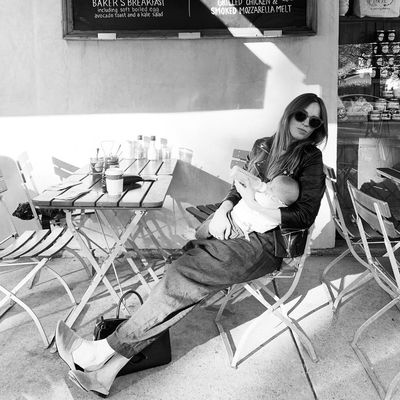
The first 20 weeks of my pregnancy were easy. Having make it past the 12-week mark, our genetic testing came back good and while I’d had some morning sickness, I was enjoying the second trimester. I was working full-time, my bump was growing and I felt great.
The day of my 20-week scan, it was one of those perfect LA days. My husband met me in the waiting room and I wasn’t worried. I’d seen my doctor that morning and everything looked good. At the end of the scan, I left and my husband rushed off to a meeting. About 20 minutes later, a nurse called me to say the doctor had tried to catch us in the hallway but couldn’t find us. She explained our baby was measuring very small for her gestational age – she was almost two months behind schedule. They told me to eat more, spend less time on my feet and come back in about four weeks.
Our baby had suspected intrauterine growth restriction (IUGR) – a rare foetal growth restriction caused by chromosomal abnormalities, problems with the placenta, maternal autoimmune complications, maternal blood infections and genetic deletions. Those are just a few of the reasons it can happen.
When we went back a month later, I was almost seven months pregnant. During the scan, I was very quiet. I was fixated on the doctor’s face – searching for any hint that things looked better. I’ll never forget what happened next. The doctor said he didn’t think the baby would make it another two weeks. I tried to negotiate with him. Could we deliver her early? What if she made it two more weeks? Couldn’t she live even if she was premature? Weren’t there incredible things they could do these days?
In short, he recommended we terminate the pregnancy. He told us there are some babies you know will be perfect and some where there’s something wrong. He explained that if we wanted to move forward with the pregnancy, I could, but I needed to have a series of tests done to rule out chromosomal abnormalities, genetic deletions, syndromes, a hole in her heart and fatal blood infections.
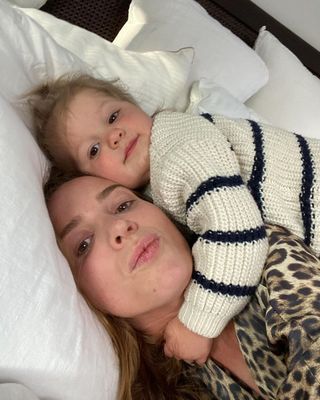
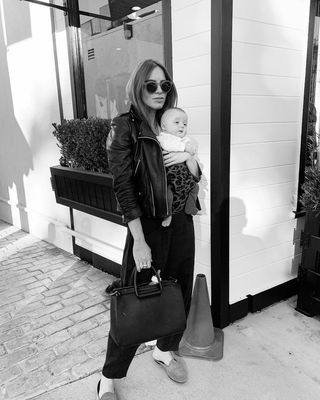

These days, I wince when pregnant women eat soft cheese, or sandwich meat, or shellfish. Before we left the office that day, I had eight blood tests done, for infections caused by food. The doctor explained that if any of them came back positive, the baby’s brain and nervous system would have been destroyed, and I would need to have the pregnancy terminated the next week.
Over the next three weeks we stopped planning to have a baby. We didn’t call the nursery ‘the nursery’ anymore. It was just a bedroom. We’d say things like “if” we have a baby in September. We did what we could not to lose our minds. Finally, when all the results were negative, or inconclusive, we decided to move forward with the pregnancy – our doctor told us she could clearly see we were already parents.
The rest of my pregnancy was spent on bedrest. I sat up only to drink and eat, and I was allowed one 10-minute walk a day. We’d been told that we needed to be ready for any adverse outcome – there were still so many things they just couldn’t test for. During this time, I also developed deep vein thrombosis blood clots, so I spent the night before giving birth being monitored while the doctors took me off blood thinners. I couldn’t sleep and woke up around 4am thinking what a journey my pregnancy had been. I was terrified the baby wouldn’t be healthy, or that she simply wouldn’t make it.
The next morning, our little girl Vivienne was born via a planned C-section. The procedure was scheduled to take 45 minutes, but she was out in 20. And she was perfectly healthy. It was the best day of my life, and nothing will ever top it – I just lay there sobbing. I remember my husband screaming “Babe, she’s perfect, she’s perfect!” It was a moment which can never be conveyed properly in words. My doctor is the only reason Viv is here today. Had she given us different advice about the terminations, we would have gone in another direction. She’s someone I now owe a great deal to.
Those first few days with a newborn are utter bliss – even the late nights and early mornings. I spent my pregnancy worried my baby wouldn’t survive. Having her healthy in my arms was unbelievable – I had quite a different experience as a new mother because of that. I didn’t have postpartum or baby blues, either, even though I was at high risk of developing postpartum depression because of the trauma from my pregnancy.

But I did hate breastfeeding, and quit after about four weeks. For me, it was too much, and I wanted my husband to be able to help – he’s been incredibly involved since day one. People were very judgemental about it, which I never understood, but I’ll never forget my husband teaching me how to clean the breast pumps, how to make a bottle, how to change a diaper... I wasn’t able to do much after the C-section, so he felt incredibly empowered. I always tell people bottle feeding can be better for the mother. If I’d continued breastfeeding, I would have developed postpartum for sure – I could feel it setting in when I decided to make the change. For me, it was the right decision.
Motherhood has taught me that, as women, we don’t talk about what a monumental change it is. For me, it’s been less about mothering and more about what I went through, and how to feel like myself again. One minute you’re this empowered, career-driven, dressed-for-the-day human and the next you’re... not. It’s more than a rebirth. Two years on, I think I’ve just about figured out how to be both versions of myself at once.
Initially, when I went back to work after the baby, I wanted to quit. I was with a large corporation and hated every single day for the first three months. A friend who had gone through the same thing told me I wasn’t allowed to quit for 90 days. At the end, if I wanted to quit, I could. But by day 90 I had found my stride. It can take a full year for your brain to turn back on. For me, I really love being a mum and working.
When other mums ask me what advice I have for them, it’s always, get dressed. Shower. Go on a date with your partner in the first three weeks. Get your hair coloured. Meet friends for brunch. This is all in normal, Covid-free times, of course. I was the up-all-night mum with milk leaking from her breasts, but I also needed to be the person my friends still called for Friday night drinks. I had to claw my way back to that, but I got there eventually. And it’s made me a better mum. And a better wife. The same goes for husbands and partners. Tell them to see friends. Work out. Get back to a version of life that feels like them.
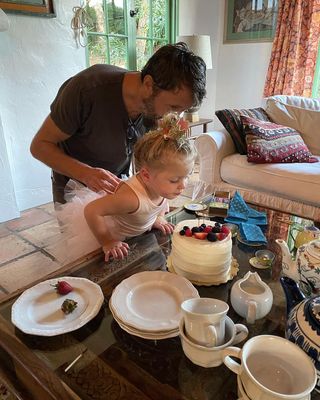
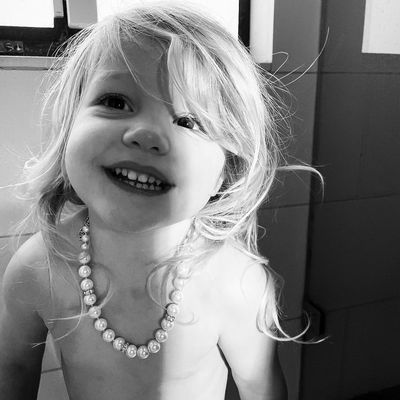

My parenting style is quite different to that of my husband. He’s from England and he’s quite strict. I’m not. But I have gotten so much better at multi-tasking. And I don’t sweat the small stuff anymore – in fact, I have fewer f**ks to give as a whole.
Let’s just say it – parenting in a pandemic is an absolute shit show. My husband and I both work and we have a part-time nanny. As working mothers, we just have to do what we have to do to get through this period. For instance, there’s more screen time in our house, right now – lots of Elmo and Trash Truck. I have a heavier schedule in the mornings so I can end my day at 4pm. For me, it’s been incredible to work from home and see Viv throughout the day.
If you’re struggling, remember, everyone is making it up as they go. No one has it figured out and everyone is trying to figure out how best to do it all. You can’t do everything amazingly every single day. But you can do some things well one day and other things well the next. As for balance, it’s not a real thing. I’ve stopped trying, and it’s been liberating. Instagram is designed to make you feel bad about how you’re doing as a parent. It’s a pretend world. Everyone is struggling behind the scenes.
We have talked about having another baby, but I feel Viv was my miracle child. I don’t know that I could mentally handle a second, high-risk pregnancy. I marvel at women who love being pregnant. For me, it was some of the worst months of my life. And while I feel guilty saying that, it’s the truth. When a friend tells me they are pregnant, my first emotion is always anxiety. So, I’m not sure that I’m quite ready yet – or even if that day will come. My greatest wish is for my daughter to be happy.
The truest thing anyone ever said to me before I became a mother is that your maternal instincts do kick in. And you will know, better than anyone, how to take care of your baby. I didn’t think I had a maternal bone in my body. But I was wrong – I’ve never loved anything more in my life.
Follow @MeganAlida on Instagram and visit ShopDorsey.com. All images are courtesy of Megan Strachan.
DISCLAIMER: We endeavour to always credit the correct original source of every image we use. If you think a credit may be incorrect, please contact us at info@sheerluxe.com.


